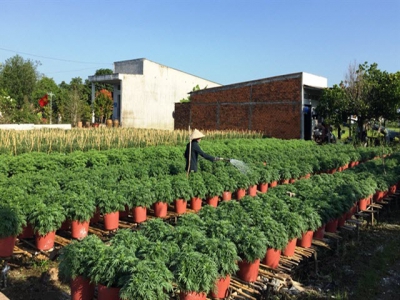Mekong Delta takes steps to improve farming co-operatives

Ho Chi Minh City — Farmers' incomes in the Cửu Long (Mekong) Delta have risen as a result of membership in agricultural co-operatives, but the effectiveness of the groups is still limited, experts have said.
Flowers and ornamental plants are cultivated by members of the Phó Thọ Flower and Ornamental Plant Co-operative in Cần Thơ City. — VNS Photo Ngọc Diệp
Đồng Tháp Province, for example, has good linkages between co-operatives and companies. Set up in 2013, the Mỹ Đông 2 Agricultural Service Co-operative has more than 100 members and has contracted with the Southern Seed Corporation in HCM City to farm rice for 16 consecutive rice crops.
Ngô Phước Dũng, director of Mỹ Đông 2, said the co-operative’s members are guaranteed outlets and have stable profits higher than rice farmers without farm contracts.
The delta, the country’s largest rice, seafood and fruit producer, has more than 1,800 agricultural co-operatives, accounting for one-third of total in the country. They have more than 230,000 members, or 15 per cent of the delta’s farming households.
The delta also has more than 11,700 co-operative groups with more than 260,000 members.
All of the co-operatives have helped the agricultural sector meet market requirements for large quantity and standard quality. Members, for example, have received instruction in advanced farming techniques to deal with climate change, including production of high-quality seeds and disease management, according to the Ministry of Agriculture and Rural Development’s Department of Co-operative Economics and Rural Development.
Though the delta’s co-operatives have links with companies under value chains, there is still a lack of investment capital and information about market outlets, according to experts.
Lê Đức Thịnh, head of the Department of Co-operative Economics and Rural Development, said that poor management had stifled operational effectiveness of cooperatives.
Most directors of co-operatives are farmers or agricultural engineers who do not have knowledge and skills in management, trade and markets, he said. The co-operatives are also small scale and find it difficult to access loans.
Nguyễn Phước Thiện, deputy director of the Đồng Tháp Province Department of Agriculture and Rural Development, said that lack of market information and incomplete legal regulations for farm contracts had hindered linkages between co-operatives and companies.
About 40 per cent of rice contracts between farmers and companies in the delta are successfully implemented, a higher rate than other agricultural products, according to the Department of Co-operative Economics and Rural Development.
Development
To improve profits, the Department of Co-operative Economics and Rural Development has ensured that farmers will have access to soft loans and receive advanced techniques and effective farming models such as intercropping of shrimp or fish, or rotation of crops in rice fields.
The agency will also be responsible for improving the skills of co-operative managers.
Other measures include working with international organisations to help farmers and co-operatives cope with climate change in the delta.
Cà Mau Province plans to establish 20 new co-operatives, 100 co-operative groups and two to three co-operative unions each year from now until 2030.
Đỗ Văn Sơ, chairman of the Cà Mau Co-operative Alliance, said the province would focus on training human resources and instructing legal regulations for developing co-operatives. It will also create favourable conditions for co-operatives to access support policies on advanced techniques, building brand names, and trade promotions.
In Hậu Giang Province, the local People’s Committee has ordered relevant departments and agencies to provide financial support for co-operatives to invest in infrastructure. The province has 21 agricultural co-operatives that meet conditions to receive support for developing infrastructure with a total cost of VNĐ25 billion ($1.07 million), according to its Department of Agriculture and Rural Development.
Related news
 Việt Nam trying to get US export licence for avocados
Việt Nam trying to get US export licence for avocados Việt Nam is in the process of getting a licence to export avocado to the US, according to the Việt Nam Trade Office in the US.
 Rice export volume up but value falls
Rice export volume up but value falls Việt Nam enjoyed growth in its rice export volume but saw value fall in the first nine months of the year
 Fruit and vegtable export figures slip
Fruit and vegtable export figures slip Việt Nam saw a 4.3-per-cent decline in vegetable and fruit export value during the first nine months of this year.